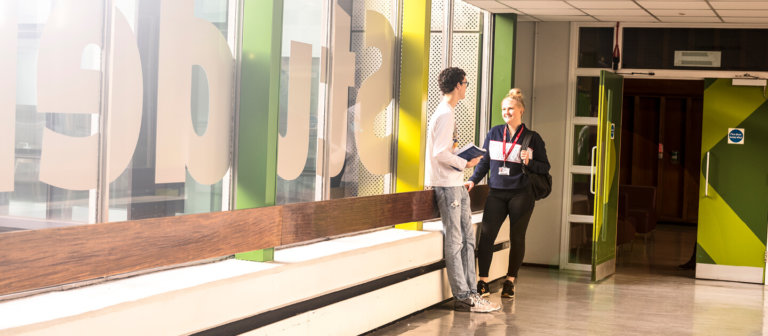
Legal practice is changing. The 2020 Wolters Kluwer Future Ready Lawyer Survey highlights how technology is growing “more critical” to how well firms meet client expectations. McKinsey estimates that 23% of work done by lawyers can be automated by existing technology. Add a pandemic — and how it has disrupted industries and exposed gaps in rights and regulations — and it’s clear future lawyers need an education that makes them agile and resilient.
A traditional LLB will give you a basic understanding of the legal system in England and Wales, Scotland or Ireland. Many universities achieve this through a combination of lectures, seminars, tutorials and workshops. This traditional model will not be enough in 2021 and beyond.
With technology transforming legal practice and more nimble career options available to law students today, a different kind of curriculum might be what many of today’s students need. It should take an experiential approach to learning, offering opportunities to develop professionally as they complete their degree. Law clinics, pro bono projects and start up competitions are not activities law schools would emphasise before, but are increasingly necessary to develop the professional skills students need to hit the ground running once they graduate.
Across sectors, practice makes perfect and in the field of law — it is increasingly crucial. Here are four law schools in the UK that agree:
London South Bank University, School of Law and Social Sciences
Highest ranked law degree in London for Overall Student Satisfaction (National Student Survey 2020). One of the highest ranked — consistently — modern law schools in the city (Complete University Guide 2021, Guardian University Guide 2021). Fifty years of history educating lawyers. London South Bank University has the track record, experience and expert academics to transform today’s law students to tomorrow’s most dynamic legal professionals.

Source: LSBU
Take, for example, its professionally accredited LLB law course. LSBU’s LLB students gain more than just a thorough grounding of criminal law, contract law, land law, EU law, constitutional and administrative law. They learn more than just academic skills like essay writing, research and advocacy. The LSBU edge is they get to do all this — and develop their career at the same time.
A learning by doing approach makes this possible and exciting. LLB students at this cosmopolitan university get to undertake work placements, internships or work experience, including in its Legal Advice Clinic. They can harness their professional skills and specialist interests in selected practice areas including Advocacy, Civil Litigation and Human Rights. As a national leader in the teaching of Law & Technology, LSBU offers a final year option where law students and computing students come together to work in project teams to design and build LawTech access to justice resources for local clients, including its own Legal Advice Clinic. Study abroad opportunities are available too, including international field trips such as the Comparative Law option. Strong links with the local legal community — such as the South London Law Society and the Southwark Legal Advice Network — and guest lectures by visiting fellows, practitioners and alumni enhance the career-readiness of LSBU students.
All of this is by design to prepare LSBU graduates for professional qualification, in particular the Solicitors Qualifying Examination. It’s the foundation that has propelled many graduates to become the successful solicitors, barristers or chartered legal executives they are today. To learn more about this transformative law school, chat with current students here or sign up for an open day here.
University of Exeter Law School
The University of Exeter Law School ranks among the top 150 for law in The Times Higher Education World University Rankings 2021. Its worldwide reputation in teaching and research makes it a top choice for students who wish to obtain a first-class legal education at an elite Russell Group university. Here, academic excellence is combined with innovative teaching to equip students with the right experience, skills and confidence before taking on the workforce.

Source: University of Exeter
The LLB Law programme here provides a solid foundation, delivering a rigorous understanding of legal principles as well as an examination of law in different theoretical and social contexts. In order to do so, facilitators keep a constant eye on regional and global developments.
Numerous optional modules are available for participants to choose from in their second and final years. These options make it possible for future lawyers to tailor their degrees to match their interests and ambitions. What’s more, students gain real-world knowledge through multiple opportunities to observe and participate in activities involving the application of the law via pro bono tasks.
Durham Law School, a world leader in legal education and research, ranks among the top 50 law schools, according to QS World Rankings. The law school is prominent, with public engagements both nationally and internationally. Award-winning academic staff here produce ground-breaking research with impact. These professionals conduct small, seminar-style group teachings, complemented with a tutorial system that employers hold in high regard.

Source: Durham University
Durham Law School’s LLB degree was designed to teach learners the basics in English and Welsh law. Specialisms are offered via optional modules offered by the school and other Durham University departments. By partaking in this course, students will be able to obtain a qualifying law degree recognised by the Solicitors Regulation Authority and the Bar Standards Board.
LLB students here will be able to engage in a growing number of extra-curricular activities led by their peers. This includes mooting and working on a range of pro bono activities. Through these opportunities, students benefit from growing their network with a range of leading employers.
The Law School, Robert Gordon University
At The Law School, in Aberdeen, Scotland, a wide array of accredited and professionally recognised law degrees are offered on-campus, online or through a blended learning format for both full-time and part-time students. The school is strategically based within the Aberdeen Business School building, a location that allows access to a number of student facilities such as independent study stations, group study pods and excellent IT services.
Its LLB degree programme caters to those who wish to gain an understanding of how the legal system in Scotland works. The programme equips participants with the knowledge, required by the Law Society of Scotland, to enter the legal profession. Students here partake in both private and public law subjects to gain the professional knowledge needed to meet the challenges and demands of several employment sectors.
An on-campus Moot Court, set up as a TV studio, is fitted with courtroom furniture and recording equipment. This space provides students with a realistic setting that enables them to get involved with mooting, where they can develop advocacy and other communication skills.
*Some of the institutions featured in this article are commercial partners of Study International







